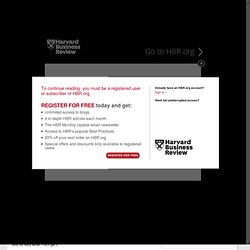

Self Examination At Harvard Business School - Daily Brief - Portfolio.com. This one will be a case study for the history books. Harvard Business School is putting together a case study to examine whether or not Harvard Business School is properly preparing its graduates for managing risk, according to Bloomberg. And instead of letting students dissect the case study as they normally do in their classes, HBS will put the test to its 219 professors. A task force was created in November to write the case study and it will present its results to professors on May 27. According to task force co-chair Professor Paul Healy, Harvard wants to determine how the school's reputation has been hurt by the crisis.
And the study also may tackle what role its own graduates may have played in the crisis. Surely the Harvard alumni fund-raising department is hoping the professors can stay mum on the results of their debate. Harvard is writing the case study in reaction to criticism that its program failed to prepare students for leadership ethics and risk control. by Megan Barnett. Small Business Worklife Balance - Careers - Portfolio.com. For many entrepreneurs, running a company and taking a vacation is a contradiction in terms. Sure, you might take a day off once in a blue moon. But a real, honest-to-goodness holiday—when you're out of the office and out of commission for, say, an entire week? That's something you said goodbye to the moment you decided to start a business. As it turns out, that attitude is not only mistaken but counterproductive. Going on a vacation is not only doable but also a requirement for growth.
"Taking a break is essential to the success of the business," says Brent Dees, a principal with Focus Four, an executive coaching firm in Charlotte, North Carolina. How so? "By not taking a vacation, you're hurting your creative spark," says Richard Rabins, co-chairman of Alpha Software in Burlington, Massachusetts, who takes about three one-week vacations a year. How 50 Companies Youve Heard Of Got Their Names: Pics, Videos, Links, News.
Venturing forth. Diapers in Brazil, heart disease diagnostic tools in Africa, and taxi services in Malaysia would seem to have little in common. But at Harvard Business School (HBS) last month, impassioned M.B.A. students were making the case that all three areas shared a key trait: They were underserved markets where new start-ups could succeed. As student finalists presented their ideas at the 15th annual HBS Business Plan Contest, they showcased not just ingenuity and business savvy, but the driving entrepreneurial spirit that increasingly guides the highly respected graduate institution. “I think this is what Harvard Business School is all about,” Dean Nitin Nohria told the crowd. “It’s a place where people can come and imagine extraordinary possibilities. This is what entrepreneurship at its core is.” In its first 100 years (1908-2008), HBS made its mark as one of the world’s best B-schools, and in recent decades as a golden ticket to competitive, high-paying jobs in finance, consulting, and banking.
The Right Way to Respond to Failure - Peter Bregman. My wife Eleanor and I were visiting some friends on a Saturday when their nine-year-old daughter, Dana*, came home.

She was close to tears, barely holding it together. “Oh sweetie,” her mom said. “What happened at the swim meet?” Dana is an excellent swimmer. She trains hard, arriving at swim practice by six most mornings and swimming some afternoons as well. It isn’t like that for all her endeavors. “I was disqualified,” she told us. We were in the foyer of the house and she sat down on the bottom stair of the staircase, her swim bag still on her shoulder, staring into space, almost expressionless. “Honey,” her dad said, “there are a lot more swim meets in the season. I told her, “The fact that you left the block prematurely means you were at your edge.
“Every swimmer on every team has been disqualified at some point,” Eleanor said. Is Starting A Business Safer Than Your Job? [Infographic] What's Better - Getting a Job or Starting a Business?
![Is Starting A Business Safer Than Your Job? [Infographic]](http://cdn.pearltrees.com/s/pic/th/starting-business-safer-than-17926040)
With a slow economy, many people have turned to entrepreneurship as a means to pay the bills. Which begs the question, what’s better today — getting a job or starting a business? We dug deep to find out the numbers and have compared the risk of starting a business to keeping a job. If you’ve ever thought about starting your own company, take a look at our graphic below to help decide if entrepreneurship is right for you.
What do you think? Small Business Loans Made Simple Create a Free Lendio Account Overview “Laid off? “True entrepreneurs reduce risk to the point that action becomes quite logical.” Unemployment Rate: 9.1% 26% of North American workers are self-employedIn 2008 on average 2,356 people went into business for themselves every day.Their ventures accounted for 78% of U.S. businesses SELF-EMPLOYMENT There are only four paths toward business ownership: Among the fastest-growing industries are: Reemployment figures: Pearltrees.